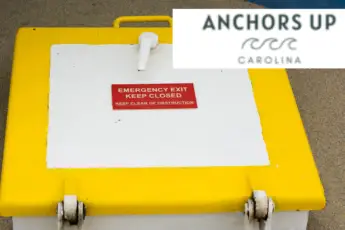Remaining safe while boating is of the utmost importance. To improve safety and prevent errors, it is critical to know the 14 common boating mistakes. Without question, boating can be done safely, but remaining mindful both while operating and before leaving the dock is essential.
Failing To Keep Enough Life Jackets Onboard
Unquestionably, life jackets are number one when it comes to live saving equipment. All too often, life jackets are overlooked in a multitude of ways.
First, boat owners do not take into consideration the number of passengers onboard compared to the number of life jackets stowed within hatches. To avoid this, always ensure that the correct quantity of life vests are available before leaving the dock.
Secondly, children do not fit adult sized life jackets. With that being said, be sure to have kid’s life vests if you’re heading out with children.
Improperly Navigating Channels
Channel markers are put in place to guide boaters through challenging stretches of water to navigate.
Often, channel markers are positioned to prevent the operator from running aground.
With that being said, it is essential to read channel markers correctly. Understand on which side of the boat a marker should pass to avoid unknowingly leaving the channel.
Running Out Of Fuel
The fuel gauge is installed on boats for a reason. The reason is to help prevent the operator from running out of gas unexpectedly.
Every time you’re planning a day on the water, it is imperative to inspect the fuel level onboard the vessel. At a minimum, for short trips, I recommend holding half a tank or more.
It should be noted that fuel sending units do fail. A sending unit measures the amount of gas in the tank. Understand that a boat may show full despite it being nearly empty. If you haven’t seen your guage move in some time, I recommend bringing the boat into the shop.
Forgetting To Inspect Engine Water Flow
Water flow in inboard, outboard, and inboard/outboard engines is critical. The failure of water to flow into the cooling system of the engine is likely to cause engine failure.
Without question, a boat will overheat without proper water flow to allow for cooling. Confirm water is flowing by inspecting the cooling water discharge port.
Running The Boat Aground
I have witnessed plenty of boaters run the vessel high and dry. Running aground is not only detrimental to the boat, but it significantly increases the risk of injuries to passengers.
Fortunately, most boats are equipped with navigation equipment. If your boat has a charter plotter, be sure to monitor it closely to avoid driving into shallow waters.
Alternatively, if you’re not fitted with navigation electronics, remain within the channel or utilize a paper chart.
Becoming Lost
Becoming lost can be compared to running aground while operating vessels. Boaters easily become disoriented while in lakes, coastal waterways, or the open ocean.
One of the ways that boaters become lost is by venturing off course. To avoid becoming lost while boating, I recommend utilizing marine navigation electronics and inputting a route plan. The route plan will guide you from the departure point to your destination.
Improper Docking Technique
While studying and learning navigation rules, weather, currents, and more will help you become a better boater, it doesn’t provide a hands-on experience.
As a former captain, I can tell you that studying and testing don’t compare to becoming familiar with driving a boat.
Without a doubt, before you dive all in on boating, it is essential to practice the basics of operation. However, docking should be practiced in areas with minimal traffic.
All too often, boaters collide with docks, pilings, and even other boats while attempting to dock. Panic quickly sets in when things go awry. To avoid this from happening to you, practice docking.
Failure To Deploy The Correct Amount Of Anchor Line
No matter if you’re fishing, beaching, or just hanging out, it is imperative to understand anchoring techniques.
One of the most important aspects of anchoring the vessel is paying out the correct amount of line. Without the proper amount of anchor line deployed, the boat is likely to drift as the anchor will not become set.
The general rule of thumb for anchoring is paying out line in a 7 to 1 ratio. To measure the correct, multiply the depth by 7.
Operating The Boat Beyond Weight Limitations
It is important to realize the fact that boats are designed to hold up to a predetermined amount of weight. The manufacturer is tasked with calculating the maximum weight capacity of a boat.
Importantly, it is critical to never exceed the loading capacity of the vessel. The capacity is a combination of gear and people.
Failing to remain within capacity puts you and your passengers at greater risk of capsizing.
Forgetting To Check The Marine Forcast Before And While Boating
Weather is an unknown variable when it comes to spending time out on the water. Before departing the dock, I suggest checking the marine forecast to determine if conditions are safe. Dangerous weather includes the prediction of thunderstorms, high winds, rough seas, waterspouts, fog, and more.
In the event that marine warnings are in place, stay home. However, weather changes, so I suggest keeping up with the weather while you’re out on the boat. I have had thunderstorms pop up on days that they were not predicted.
Launching The Boat Without The Drain Plug
Although small, a drain plug plays an important role in the buoyancy of a boat. Often, boaters fail to install the drain plug before launching the boat into the water.
The drain plug is often removed while the vessel is stored to prevent the accumulation of water within the bilge.
Before rolling the trailer and boat into the water, double check that the drain plug is in place. This is high on the list when it comes to common boating mistakes.
Failing To Learn The Rules Of The Road
Basic boater safety courses, which are required in most states to legally operate a boat, teach the rules of the road.
However, navigating safely goes beyond passing the safety course test. Instead, it is important to memorize the rules of the road to avoid dangerous situations. The situations include colliding with other vessels, passing procedures, right of way laws, and more.
Avoiding Routine Maintenance Procedures
The last thing you want while out on the water is mechanical failure. While mechanical failure can happen out of the blue, it is more likely when the owner prevents to keep up with routine maintenance.
In order to reduce the chances of breaking down, follow the maintenance routine per the boat and engine manual.
Forgetting To Inspect Safety Equipment
Onboard safety equipment goes beyond the life jackets. By law, vessels are required to carry signaling devices that do expire over time.
For this reason, it is essential to set a reminder to check expiration dates. Not only could your life depend on it, but it can lead to a hefty but avoidable fine from law enforcement.
Remember These 14 Common Boating Mistakes
Without a doubt, keeping these 14 common boating mistakes on the top of your mind will help improve safety. Boating is a fun activity for family and friends, no matter if you’re fishing, cruising, or beaching. Lastly, remember that not all fellow boaters are considering these mistakes. Therefore, stay on guard at all times.







